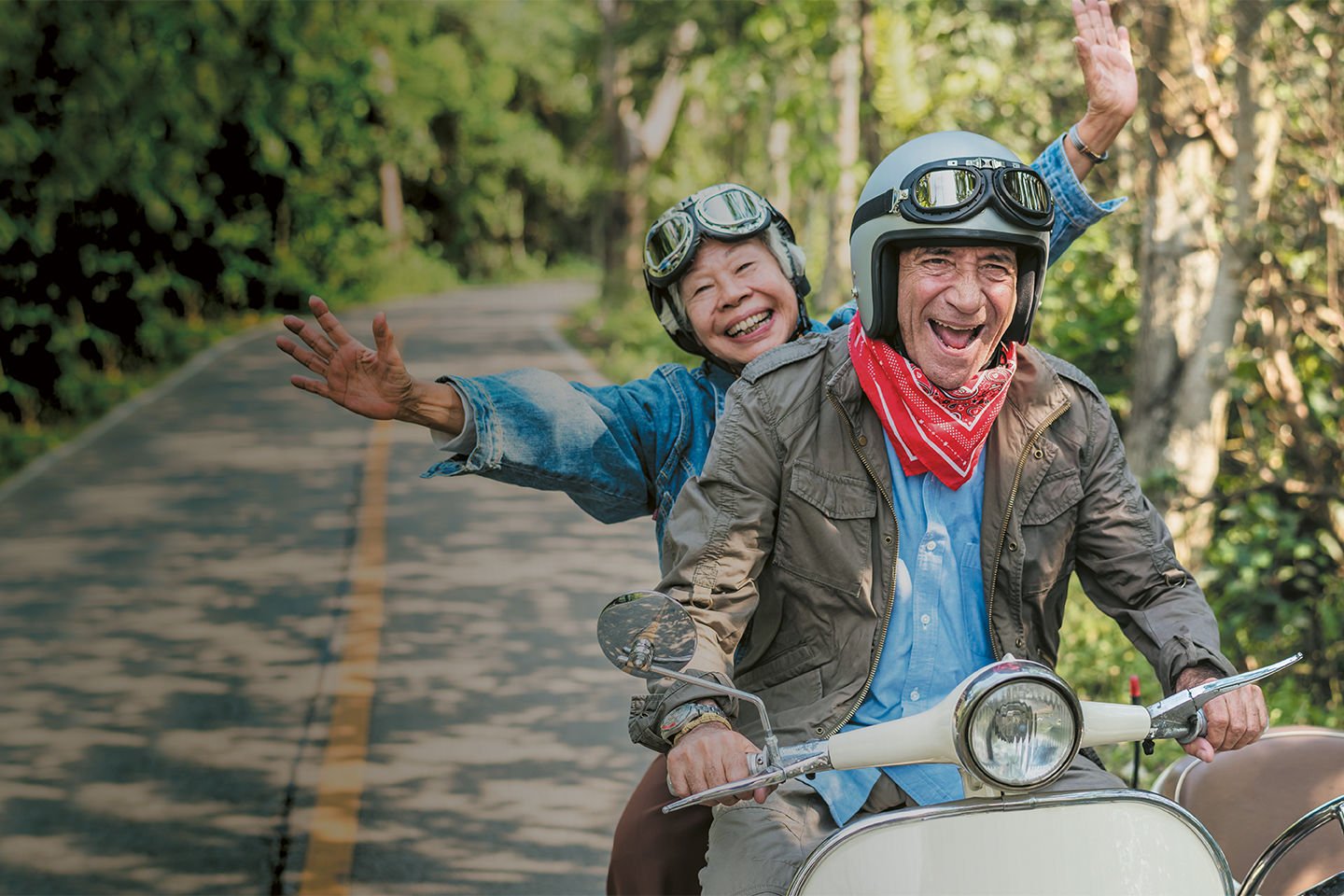Living your best life in retirement
For most people, retirement represents freedom and the opportunity to live well without obligation. But for some, the lack of structure and reduced social interaction can be challenging. Here, we get some tips and advice on how to get the most out of your retirement.
By Nadia Howland

When Dave’s father Ron retired in 2022, he noticed a pattern of lifestyle changes that concerned him.
“Primarily, I noticed he was drinking a lot more alcohol during the week, because there becomes less distinction between weekdays and weekends when you are retired,” Dave explains.
“At first it was just joking references to ‘beer o’clock’ at 4pm. Then it progressively became beer, a glass of scotch, and a bottle of red wine at dinner most nights of the week.
“We noticed he just generally seemed a bit more lethargic. I asked Mum what the go was and she said he had fallen out of his sleep routine. He didn’t have to go to work so his sleep patterns were very ad hoc.
“I think what worried us most was that he just seemed to be at a loose end. Mum tried to sell him on the idea of joining a Men’s Shed or signing up for squash but he wasn’t interested. It’s hard because you don’t want to be that person who is constantly pressuring them.”
It’s a situation many older Australians find themselves in when they retire. Lack of routine and fewer social interactions can result in people becoming withdrawn and/or adopting behaviours that lead to negative outcomes.
Donna says her older sister Carmen retired two years earlier than planned when her work laid off staff during the pandemic. When things started opening up again, she turned to pokies to cure her boredom.
“It wasn’t abnormal or anything at first but then I realised she was going almost every day. I immediately started worrying because our father had a gambling problem and I didn’t want her throwing her life savings away,” Donna explains.
“We used to spend our weekends together shopping or planning trips, but then I started to see less and less of her because she was trying to hide the pokies thing from me. I actually wished there would be another lockdown to stop her from going.”
How to avoid the retirement blues
I put the question of how to avoid retirement blues to a number of semi-retired and retired friends, family, and acquaintances. Here’s what they said:
Ken: Build hobbies and interests before you retire. That way when you finish working, you’ve got something to do. Ever since I was a teenager, I’ve wanted to play guitar. Six months before I retired, I bought myself a guitar and lined up some lessons. I’m loving it.
Jon: Have all your health checks sorted before you retire and get them done regularly. I retired and immediately had all these health problems pop up because I’d avoided the doctor for years. I was annoyed with myself because it meant I had to have surgery, which put my travel plans on hold.
Liesl: Have a bucket list. It gives you a sense of purpose. My next one to cross off is getting my scuba diving certification, when time and funds permit.
Dimity: Consider volunteering. It’s a wonderful thing to do and you meet the loveliest people. It has given me a sense of purpose and a way to ‘give back’ to the community.
Geoff: You have to have a routine, even if it’s a flexible one. Otherwise, you’re just all over the shop. You also need to have good financial advice or a solid financial plan. That provides security and reassurance.
Lizanne: Some people enjoy doing nothing but I like to have things on the calendar. It gives me something to look forward to. I have eight siblings, so at the beginning of every year I plan trips and catch-ups to see them all. I think I’m busier than my kids who work full-time!
Everyone’s picture of the perfect retirement will look different. While some retirees look forward to travelling or ticking items off their bucket list, others simply want to enjoy some well-earned rest and relaxation.
I spoke to a GP friend, Anthea, who said preventative health and lifestyle medicine is really important for anyone at this life stage.
“The Royal Australian College of General Practitioners (RACGP) recommends a guide called SNAP—Smoking, nutrition, alcohol and physical activity,” she explains.
“Each of these factors carries a risk factor. We obviously recommend people avoid smoking and follow a nutritious diet based on fruit and veg, wholegrains, protein, calcium, and minimal sugar. In terms of alcohol, the less you drink, the lower your risk of harm.
“That doesn’t mean you have to cut it out completely, but having alcohol-free days can be really helpful in making sure you don’t form bad habits when it comes to drinking.
“Then we look at physical activity. The recommendation here is to move every day in a way that feels safe for you. Physical activity is really important for not just fitness but maintaining our bone density and preventing falls. This is really key to maintaining your mobility and independence as you age.
“Swimming and tai chi are both fantastic, low-impact forms of exercise. Tai chi is actually great for balance, joints and ligaments, and a number of clinical studies show it has a direct link to reducing the risk of falls later in life.”
And while it’s important to maintain our physical health, Anthea says it’s really important to pay attention to what’s going on ‘up top’ as well.
“There’s no guidelines with respect to our brains, unfortunately, but obviously our brain controls our entire body and is responsible for our emotional well-being.”Anthea says it’s important to make sure you are getting good-quality sleep and keep your brain active. This could include
doing puzzles, reading, playing competitive games such as bridge, playing an instrument or even doing hobbies such as woodwork or knitting.
“It’s so valuable to do things that get your mind and hands are working together, and even better if you get loads of enjoyment from that activity."
As social creatures, it can be a shock to the system when retirement reduces our opportunities to interact with others in the workplace.
If you don’t already have established social circles, there are plenty of ways to keep you in good company. Some of these include hobby groups such as pottery clubs, sporting clubs such as tennis or lawn bowls, and local groups like Men’s Sheds or community gardens.
And, love it or hate it, social media can also be a great tool for making like-minded friends.
When Siti posted on her local neighbourhood Facebook group looking for companions to join her for coffee, she received a message from a lady who lived just two streets away.
“She already had a group coming to her house for ‘coffee and crochet’ twice a week. I didn’t know how to crochet but that was OK. They’re teaching me.
"There are women my age as well as young mums with their babies. It’s just a nice way to meet new people who live locally.
“We share our interests and hobbies. I’ve had a few of them over to my place for Malaysian cooking lessons. Another lady does the most beautiful cakes you’ve ever seen and she is teaching me and one of
the other girls to do sugar flowers.
“If you have Facebook, it’s worth having a look at your local groups. People are really welcoming and it’s just great to get to know your neighbours, I think.”
My neighbour, Trevor, says he made a conscious decision to ‘ease in’ to retirement.
“I could have fully retired a decade ago but I found it really challenging to just switch off my professional life,” he says.
“I usually work two to three days a week now as a consultant, and that suits me. My wife and I have a place down the coast and we spend most of our time there. I think I’d get bored if I didn’t have a reason to come home.
“I’ll retire completely eventually and perhaps at that point, we’ll look into doing cruises or longer trips.”
Tabitha, another neighbour, agrees that semi-retirement is a great option. Working casually as a shelf stocker at a local supermarket gives her ‘play money’ in addition to her savings.
“With cost of living the way it is, I think a lot of retirees are going to be looking at doing a couple of days’ work here or there,” she says.
“I also enjoy the work because I hate being on my own at home all day. The work I do is easy and the people I work with are good fun. I’ve made some good friends. I only work when I want to and if I want to go on a holiday, I can do that.”
Regular health check-ups are important for everyone, regardless of your fitness level, age, or gender. They may help you live a longer, happier life by preventing a number of health problems from occurring. If you are aged 45 or older, you may be eligible for a fully bulk billed general health check.




